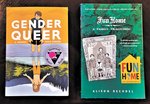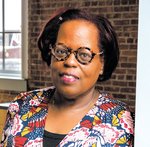The rising book censorship movement has reached Rhode Island, although so far it lacks the intensity seen in many regions of America. Still, libraries and organizations around the state are …
This item is available in full to subscribers.
We have recently launched a new and improved website. To continue reading, you will need to either log into your subscriber account, or purchase a new subscription.
If you are a current print subscriber, you can set up a free website account by clicking here.
Otherwise, click here to view your options for subscribing.
Please log in to continue |
|





The rising book censorship movement has reached Rhode Island, although so far it lacks the intensity seen in many regions of America. Still, libraries and organizations around the state are responding with a range of efforts to protect access to controversial titles and book events such as story hours -- and to shield librarians from lawsuits.
These are among the findings of an Ocean State Stories investigation conducted this March.
“We’ve seen an uptick in attempts to disrupt drag story hours and events like that happening at various libraries around the state,” Beatrice R. Pulliam, Vice President of the Rhode Island Library Association and Interim Co-executive Director of the Providence Public Library, said in an interview.
• “There are lots of different reasons why people ban books but more and more it's been much more pervasive in really building an agenda or a space of saying ‘this is the narrative that we want in our library, we don't want to hear anyone else's perspective,’” said Rachael Juskuv, Rhode Island Library Association president.
• One Rhode Island book-banning effort that generated widespread publicity involved Westerly, where resident Robert J. Chiaradio Jr. led a campaign to have “Gender Queer: A Memoir” removed from the high school library. Chiaradio and others maintained that the graphic book, by Maia Kobabe, who recounts an exploration into gender identity, was pornographic. “Gender Queer” is one of the most-banned books today in America.
According to The Westerly Sun in an article posted on May 15, 2021, Chiaradio created a private Facebook group, Westerly Residents Against Indoctrination, which has a membership of more than 1,100 and states that “we fight against the racialization, via aspects of Critical Race Theory, and radicalization, of our schools, as well as the normalization and obsession with pedophilia, pornography, and gender issues in our classrooms and school libraries. We march on every day to protect these kids, our many good teachers, and our great country. Please make your voices heard!”
The Westerly effort was supported by the Rev. Giacomo Capoverdi, pastor of Immaculate Conception Church in Westerly, and other clergy members who wrote a letter last fall to The Sun that stated: “While there may be other books in the Westerly High School library that we are unaware of, we know that there are two such books that are currently available: ‘Gender Queer’ and ‘Fun Home.’ ”
“Fun Home: A Family Tragicomic,” by Alison Bechdel, has also been banned elsewhere in the U.S.
“While the overall intention of the authors may not have been to peddle pornography,” the letter by Capoverdi and others continued, “the truth is that these texts contain both pornographic images and descriptions that should not be accessible to adolescents in the library of a public high school…
“We are not opposed to these materials because they are supported by groups whose beliefs run contrary to ours. We are opposed to any and all explicitly sexual, pornographic materials where children have access to them in public school libraries.”
• “Gender Queer” chronicles the author’s journey of discovery of sexuality and gender discovery from childhood to adulthood that ends with Kobabe identifying as gender nonbinary. The book includes a few sexually explicit images. “Fun Home,” an exploration of gender identity and dysfunctional family life by cartoonist Bechdel, a lesbian, contains images of partial nudity. It was a national bestseller and was finalist for the National Book Critics Circle Award in memoir.
“Gender Queer” and “Fun Home” remain in the high school’s collection. But a related banning effort last year in Pawtucket succeeded when a parent of a freshman at the public Jacqueline M. Walsh School for the Performing and Visual Arts objected to a planned performance of “Fun Home.” Faced with the objection, the performance was canceled.
Although the specific objections have varied over time, with the current wave associated with the rise in attacks on the rights of LGBTQ+ individuals, book banning has a long history in America. Among the classics that have been banned over the decades, according to the American Library Association (ALA) and other sources:
• “To Kill a Mockingbird,” by Harper Lee;
• “1984,” by George Orwell;
• “The Color Purple,” by Alice Walker;
• “The Great Gatsby,” by F. Scott Fitzgerald;
• “Of Mice and Men,” by John Steinbeck;
• “Lord of the Flies,” by William Golding;
• “I Know Why the Caged Bird Sings,” by Maya Angelou;
• “One Flew Over the Cuckoo’s Nest,” by Ken Kesey;
• The “Harry Potter” series, by J.K. Rowling;
• “The Adventures of Huckleberry Finn,” by Mark Twain;
“The American Library Association condemns censorship and works to ensure free access to information,” the ALA declares on its website. “Every year, the Office for Intellectual Freedom (OIF) compiles a list of the Top 10 Most Challenged Books in order to inform the public about censorship in libraries and schools. The lists are based on information from media stories and voluntary reports sent to OIF from communities across the U.S.”
But the ALA adds, “the Top 10 lists are only a snapshot of book challenges. Surveys indicate that 82% to 97% of book challenges – documented requests to remove materials from schools or libraries – remain unreported and receive no media.”
See the American Library Association’s annual ranking of the Top Ten banned books, year-by-year from 2000 to today:
Steven Brown, Executive Director of ACLU of Rhode Island, is among those who have taken a strong stand against this form of censorship.
“The wave of book banning that is sweeping the country, while far from unprecedented, is deeply troubling,” Brown declared. “A healthy democratic society requires a respect for freedom of speech and thought and the opportunity for all points of views to be heard.
“The focus of current censorship attempts -- aimed largely at books that deal with, and speak to, marginalized and vulnerable groups -- undermines core civil liberties values and especially needs to be condemned in the strongest possible terms.”
Brown noted an intrinsic irony in the activities of book banners, telling Ocean State Stories: “The only consolation from these disturbing attacks on the freedom to read is their likely counterproductive impact: generating a heightened interest among people in reading the ‘forbidden’ books. Mark Twain's response to the banning of ‘Huckleberry Finn’ from a Concord, Massachusetts, library and the consequent publicity surrounding it remains the best retort to these assaults on the First Amendment: ‘That will sell 25,000 copies for us, sure.’”
The ACLU of Rhode Island participates in the annual Banned Books Week, sponsored by the ALA, the American Society of Journalists and Authors, Amnesty International USA, the Association of University Presses, PEN America, the Authors Guild and other prominent organizations. Banned Books Week, which receives support from HarperCollins Publishers and Penguin Random House, will be Oct. 1 to Oct. 7 this year.
“Why does the ACLU defend the freedom to read?” says the ACLU of Rhode Island on its website. Because “the ACLU is dedicated to free speech and free expression. When a small group of individuals tries to keep the rest of society from reading a book, viewing a painting, or voicing their opinions, they undermine the freedoms guaranteed by the Bill of Rights.”
The Rhode Island Center for the Book, which declares its mission to be celebrating “the art and heritage of reading, writing, making, and sharing books,” has joined the cause.
“We believe that every Rhode Islander should have access to a diverse array of reading selections and that the voices of the few should not limit the choices of the many,” the center said in a statement that director Kate Lentz provided to Ocean State Stories.
“Public schools and libraries in our state have existing systems in place to handle concerns about an individual student’s reading choices. When pro-censorship individuals and organizations seek to overwhelm these systems and pressure educators and administrators to pull long lists of books from their shelves, the result is soft censorship and an erosion of freedom for Rhode Islanders.”
The center, she said, “is pleased to partner with the American Library Association in support of Unite Against Book Bans, a national grassroots campaign to engage the public in the fight against censorship. This non-partisan campaign leverages the reach of national organizations representing librarians; educators; parents; authors, publishers; distributors; champions for civil liberties, civil rights, and equality; and more. When we unite, we are stronger.”
An initiative of the ALA, Unite Against Book Bans cites statistics that it asserts demonstrate that “on both sides of the aisle, large majorities of voters and parents oppose book bans,” with 71% of voters opposing “efforts to remove books from public libraries” and 67% of voters opposing “efforts to remove books from school libraries.”
Speaking with Ocean State Stories, Aaron J. Coutu, director of the Warwick Public Library, described the mechanism in place at his system regarding books that someone might question. It is similar to the protocol at other libraries around the state.
“Every library has a collection management or collection development policy that helps set up categories and details about how we make selections of materials,” Coutu said. “The hope is to make sure we have well-developed collections that reflect everyone in our communities – both what they would like to do for entertainment and materials they might need to learn about different subjects for school or just for personal self-interest.
“That policy also provides us with opportunities to continue to evaluate the material in the collection in order to let us know when a book should be removed if it's too old or if it's out of date, or also if there are some things that might have been purchased that may not reflect what we thought they were at the time of purchase.”
Library patrons with concerns, according to Coutu, are invited to communicate directly with a librarian.
“Usually that includes a staff member speaking with them, going over what they thought the book or the DVD might have as a difficult circumstance -- basically doing what you would want to do in any circumstance of good customer service, hear their problems and try to address them as much as possible.”
On all but one occasion, Coutu said, patrons have been satisfied.
The one unsatisfied person, he said, took the next step available to all: filling out a form that is then brought to the library’s review committee where “we can weigh both their views and opinions along with what we know about the item from reviews, from award lists, and kind of create a balance. Not every book is a good fit for every person, but that doesn't mean that there isn't a person for each particular item in the collection.”
The one occasion, according to Coutu, was an objection to the eBook “My Body Is Growing: A Guide for Children, Ages 4 to 8,” by Dagmar Geisler. That objection has been referred to Ocean State Libraries, the organization serving more than 50 library systems in the state. OSL provides a statewide catalog and research tools, among other features, and offers digital downloads.
An OSL committee decided to remove the book, though not because it was deemed obscene, according to Coutu. Rather, he said, it was deemed to have been translated poorly into English, was considered out of date, and had no professional reviews, “which violated the collection development policy.”
A bill to shield librarians against allegedly “pornographic” lawsuits, H 6066, was introduced into the General Assembly on March 3. It is sponsored by state Reps. David Morales, D-Providence; Enrique Sanchez, D-Providence; Brandon Potter, D-Cranston; Joshua J. Giraldo, D-Central Falls; and Leonela Felix, D-Pawtucket.
The bill would amend a law that allows criminal prosecution of individuals involved in “obscene and objectionable publications and shows” judged to be obscene and lacking “serious literary, artistic, political and scientific value.” The amendment would add “educational” and “governmental” to that list, providing school and public libraries and their employees an “affirmative defense” against lawsuits that would, in essence, render such lawsuits baseless.
“Libraries and educational institutions carry out the essential purpose of making available to all citizens, a current, balanced collection of books, reference materials, periodicals, sound recordings and audiovisual materials that reflect the cultural diversity and pluralistic nature of American society,” the bill states.
“It is in the interest of the state to protect the financial resources of libraries and educational institutions from being expended in litigation and to permit these resources to be used to the greatest extent possible for fulfilling the essential purpose of libraries and educational institutions.
“In any prosecution arising under this section, it is an affirmative defense that the defendant was a bona fide school, museum, or public library, or was a person acting in the course of employment as an employee or official of such organization.”
Coutu and a representative of the ACLU of Rhode Island were among those who testified in favor of the bill last Thursday during a House Judiciary Committee hearing. Opponents of H 6066 also testified, including a man who in a written statement declared that “not only should this bill be rejected, but the five people who proposed/sponsored it should be censured for supporting the destruction of our youth.”
The Rhode Island Library Association’s Intellectual Freedom website page has a form for anyone who has experienced censorship to report the incident to RILA for investigation. The page also outlines the association’s policy on attempts to ban books and other library materials.
In recent months, the seven-paragraph policy begins, the association “has observed a few individuals and organizations advancing the proposition that the voices of the marginalized have no place on library shelves. They have launched campaigns demanding the censorship of books, resources, and instruction that provide information and depict the authentic experiences of marginalized individuals.
“Falsely claiming that these materials are subversive, immoral, or worse, these groups induce elected and non-elected officials to abandon Constitutional principles, ignore the rule of law, and disregard individual rights in order to promote government censorship of library collections.
“RILA is committed to upholding our core values, which include equitable access to knowledge, social justice, and intellectual freedom. We stand firm in opposing any effort to censor materials, suppress knowledge, label views as “controversial,” or dictate what is orthodox in history, politics, or belief. The unfettered exchange of ideas is essential to the preservation of a free and democratic society.”
In their interview with Ocean State Stories, RILA executives Juskuv and Pulliam brought the issue into sharp focus.
Juskuv said: “Freedom of information and the ability to obtain information is something libraries hold very dear: That anyone can find what they're looking for. The different perspectives that the world has is a really essential part of why libraries exist, and people can always trust that a library will have as many perspectives as the world holds itself.”
Said Pulliam: “We're trying to be not just reactive but really a source for assistance and support, formulating responses and also of being able to direct specific questions to either someone at ALA or someone within the region. So we are really trying to take a proactive stance for some of these challenges that are coming because it just seems like this is, sadly, the new normal.”
Editor’s note: Miller was a member of the Jesse M. Smith Memorial Library Board of Trustees from 1995 to 2009, serving as chairman from 1997 to 2009. The Smith public library serves Burrillville, R.I. Miller has been a trustee emeritus since 2009.
1 comment on this item Please log in to comment by clicking here
ride8575
Shall we ban the Bible? If I recall, it describes and discusses a lot of violent, illicit, and non-consensual *** acts. And then there are the ****-erotic passages....
One would think that some of our brethren would like to turn back the clock a century or more. They seem to aspire to creating a theocratic government, such as in Iran or Afghanistan, where morality is dictated by law and enforced at the point of a gun! Sorry - been there, done that. And I've got news for you: WE AIN'T NEVER GOING BACK!
Sunday, April 30, 2023 Report this